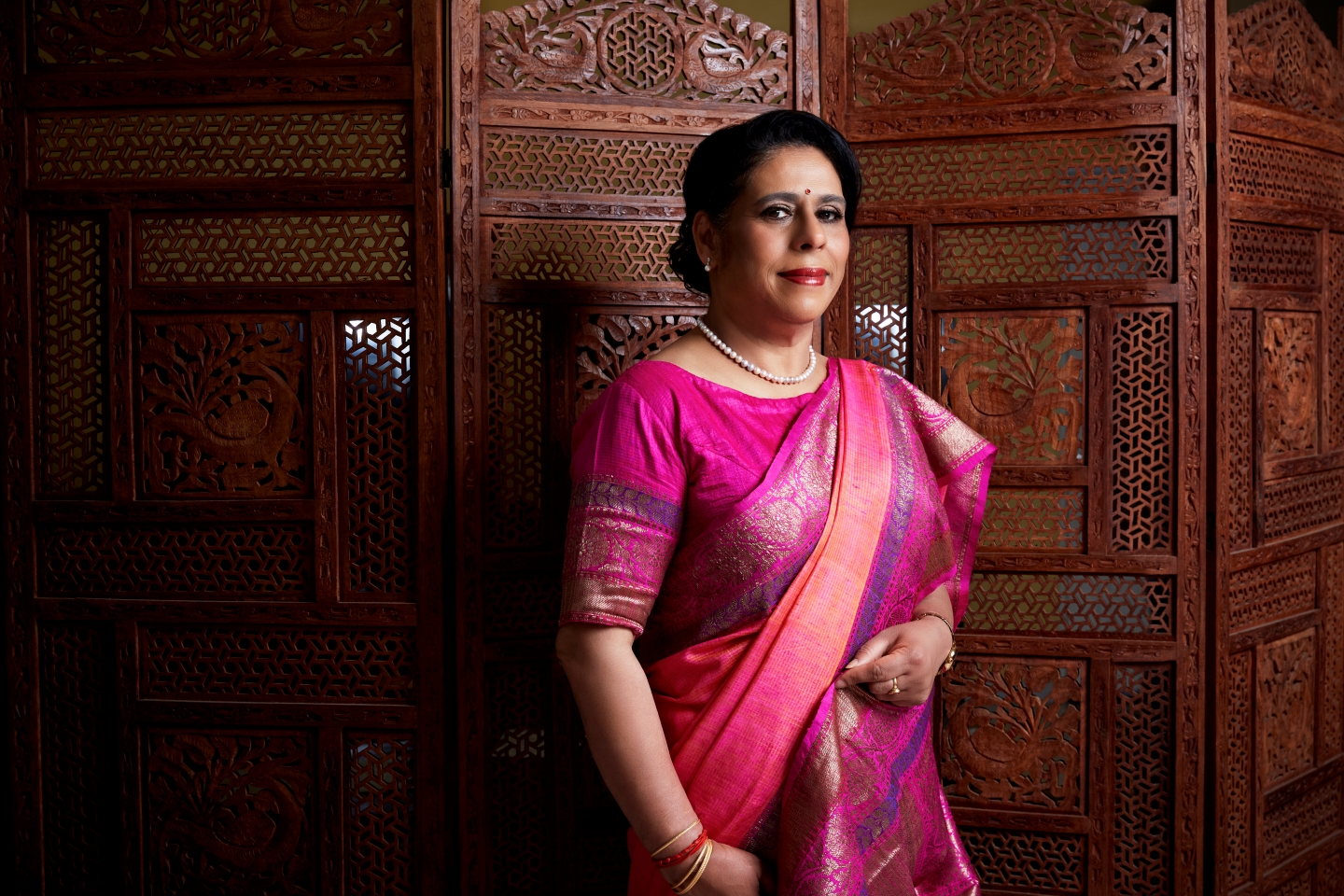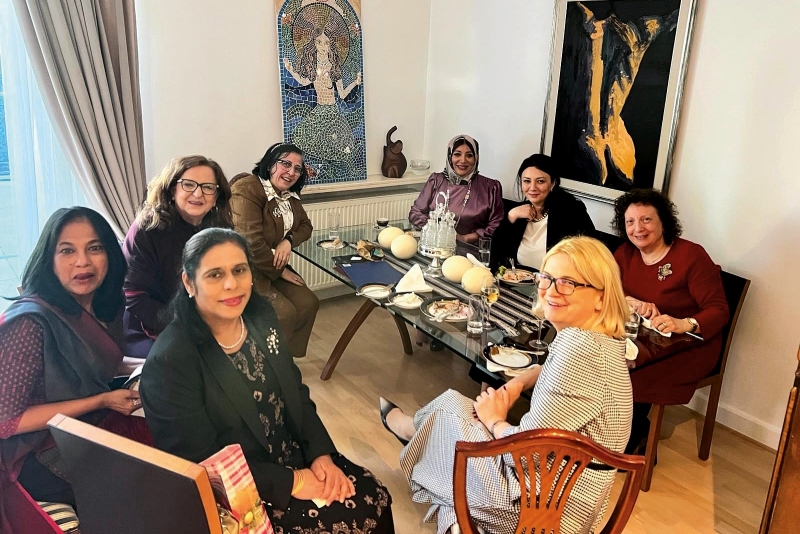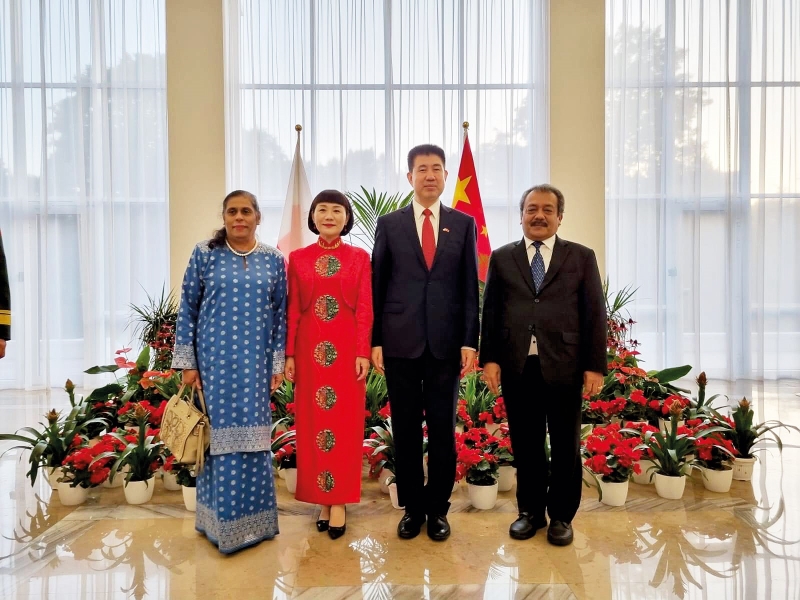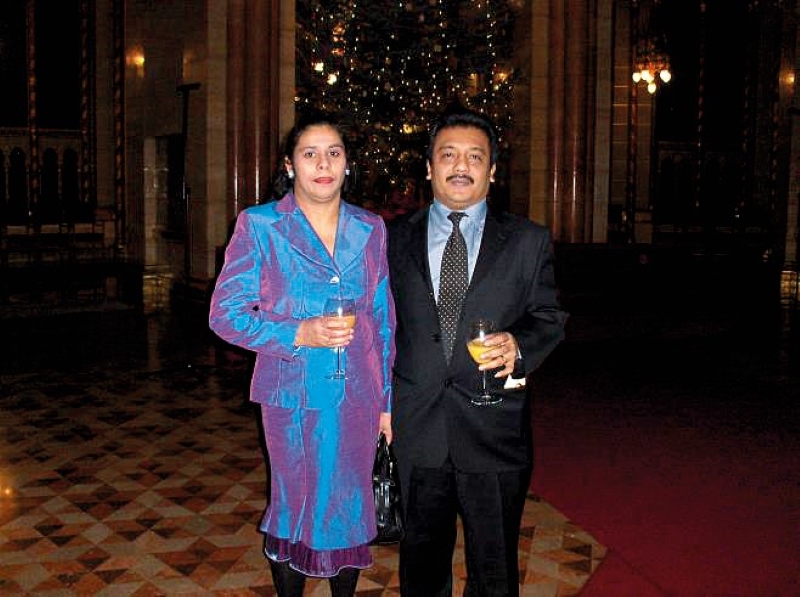
The accidental civil servant talks about her eclectic career path and how diplomacy eventually became her calling (Photo: SooPhye)
It has been more than two years since Russia invaded Ukraine on Feb 24, 2022, escalating tensions that had been simmering since 2014. The shock invasion, which marked the single-largest attack on a European country since WWII, resulted in streams of refugees pouring into neighbouring Poland, particularly via the border crossing at Medyka, the closest Polish city to Lviv, Ukraine.
A firsthand witness to all this turbulence is Her Excellency Datuk Chitra Devi Ramiah, Malaysia’s ambassador to Poland, who was also appointed to oversee Ukraine during these restive times. You would not imagine this elegant, soft-spoken lady dressed in a saree to be anywhere near a war zone, let alone serve as a high-ranking diplomatic emissary.
“I had made preparations with my Asean colleagues since the start of October 2021. We did not expect Russia would actually initiate the attack, but had to be prepared,” she tells Options during a whirlwind trip home recently.
“Malaysia, Indonesia and Vietnam have resident embassies operating in Ukraine, while the Philippines and Thai embassies are accredited from Poland. So, we devised contingency plans on how we could assist each other with our embassy staff, families and nationals. When the military action began, evacuating Malaysians from Kyiv found temporary refuge in Lviv, where the Philippines embassy in Warsaw maintained a safe house. They generously — and in the spirit of good neighbourliness — allowed all Asean embassy staff and nationals to use it. Fortunately, there was only a handful, as most had left much earlier before the conflict began.”
War + peace
Two years on, Chitra Devi clarifies that the situation in Poland remains relatively normal. “Early on, we had already deduced that Russia’s grievance concerned the expansion of Nato into Ukraine. Strategically, it is not in Russian interest to attack a Nato member country, of which Poland is a member. Nevertheless, there were lingering apprehensions in case we got our calculations wrong or there was a deeper underlying issue not accounted for in our analysis.”
Listening to her speak so calmly and matter-of-factly, it might surprise many that the intrepid diplomat is no stranger to crises and near-death incidents. She emerged unscathed through a variety of situations, including Ops Pyramid (the 2011 incident in which 8,000 Malaysian students had to be evacuated when law and order broke down in the major Egyptian cities of Cairo, Luxor and Alexandria after tumultuous rallies called for the ouster of then-president Hosni Mubarak); the catastrophic 2014 flooding in Jammu-Kashmir; and almost dying because terminal internal bleeding led to her spending more than a month in a hospital ICU while posted in Chennai, India. “I have always taken life in my stride. Besides, I don’t see the point in getting mired in situations that I have absolutely no control over,” she says.
img_9067.jpg

Eclectic youth
Spiritually inclined and deeply religious, Chitra Devi frankly acknowledges diplomacy never factored in her career plans. Born in Kuala Lumpur and the eldest of six siblings, the 59-year-old describes her traditional Hindu family upbringing as “very disciplined”. Education was of utmost importance and the children were brought up to conform to cultural and religious practices such as fasting as well as vegetarianism during specific occasions and festivals.
“I was raised by my father’s sister and lived with her until I married. I usually visited my mother and siblings after school on Fridays and over the weekend,” she recalls. “My aunt was very strict and authoritative in bringing up my cousins and me, and the emphasis was always to wake up early, pray and study. That was the routine, the regime … but it groomed me to focus on my studies, which I knew was the only gateway to achieve all my ambitions and aspirations.”
Chitra Devi completed her primary and secondary education at the all-girls Convent Bukit Nanas, which was founded in 1899, and was set to further her studies in London when tragedy struck. “My father suffered a stroke just a few weeks prior to my flight. I loved him too much and wanted to be with him during this difficult time. Also, being the oldest and with my siblings still very young, I heeded my aunt’s advice to postpone my plans.”
Dutifully, she stayed and completed her Form Six studies, followed by the London Chamber of Commerce and Industry advanced diploma in group accounting in 1984. In 1986, she completed Part One of the gruelling Association of Chartered Certified Accountants exams after just a year of evening classes. “I was also giving tuition to Form Three and Form Five students for a while to earn some pocket money,” she smiles. In the meantime, she applied for and won a spot at Universiti Kebangsaan Malaysia on a full scholarship from the Public Service Department (JPA).
The decision to base the thesis of her degree on the Pure Life Society, a home for orphans and underprivileged children, proved to be pivotal. “I had always wanted to serve in international organisations like the United Nations and travel the world while helping the poor and doing social service. It was at Pure Life that I met [its founder, the late Datin Paduka Dr] Mother Mangalam, who taught me about humanity and spirituality while imparting life lessons. Most of all, she taught me about serving the needy.”
Where Mother Mangalam was the encouragement, the good seed was sown much earlier on by Chitra Devi’s own father, a high court bailiff. “I spent a lot of time at the courthouse waiting for him to finish work. I witnessed him assisting many with their problems, which I, as a child, could not comprehend. Later, he took me to visit shelter homes to donate food to people and I remember vowing to feed and clothe them when I was grown up.”
Alchemy of good intentions
It was Paulo Coelho who wrote: “When you want something, all the universe conspires in helping you achieve it.” And it was over a dinner for the children of Pure Life Society that Chitra Devi met the then-general manager of Mercantile Insurance Sdn Bhd, Datuk Ho Sai Kong. “He invited me to join him, taking up a specially created post as head of complaints and inquiries to manage the settlement of insurance claims, which I accepted right after submitting my final thesis.”
As the company was under receivership by Bank Negara Malaysia and managed by Arthur Andersen, she immediately set about dealing with the backlog of delays, expediting them and ensuring customers got a fair payout. After two years, Arab Malaysian Bank beckoned and then Metallgesellschaft AG, an established German company which “paid me very well, with a car and driver”.
Despite earning substantial remuneration, Chitra Devi felt discontent beginning to brew. “My deep desire to address social and humanitarian issues just kept getting stronger. I was in search of purpose, a way to contribute to the poor and needy, and how I could effect change. Upon introspection, I realised that a good, well-paying job didn’t give me any satisfaction. I had no answers then, but it later dawned on me that a government position could be a good career platform while also being of service to my fellow countrymen.”
img_9055.jpg

Surprisingly, her father discouraged her aspirations, concerned that the starting pay in government service would be way below what she was already earning, not to mention it would take years to reach a position where she could influence policy changes. “Once he realised I was adamant, he brought me one Saturday morning to consult with the late Tun Mohamed Eusoff Chin, then chief justice of the Federal Court of Malaysia. We met in his chambers and, after quite a lengthy conversation, Tun concluded that I indeed had the passion and advised that I join the civil service as an administrative and diplomatic officer (PTD). He was even kind enough to instruct his office assistant to get me the forms and two envelopes, all the while explaining to me the processes involved.” Exactly two months later, an advertisement for PTD positions appeared in the newspapers.
After successfully serving as a PTD officer, followed by postings with the ministries of human resources and works, Chitra Devi contemplated a sabbatical because of health issues. “I thought of pursuing a master’s programme in Japan and approached the Public Service Department. What happened instead was an unexpected transfer to the Ministry of Foreign Affairs, which was part of JPA’s cross-fertilisation programme.”
Reporting for duty at Wisma Putra in January 2002, she immediately threw herself into her new role, learning all she could about the job, culture, style and nature of work. “Wisma Putra’s focus is to uphold and protect Malaysia’s national interests, territorial integrity, sovereignty and relations with other countries in the world. The vast scope requires officers to specialise in various strategic areas. We need to track and analyse geopolitical developments, more so given today’s environment, and advise the government of the day accordingly in foreign policy direction.”
Among Chitra Devi’s first assignments was to the newly established Organisation of Islamic Conference (OIC, now known as the Organisation of Islamic Cooperation) department. “This provided me with the best opportunity to quickly learn the ropes, what with Malaysia preparing for many emergency terrorism summits and meetings. It was also right after 9/11 in 2001, and we were preparing to be the host nation of the 10th OIC Summit in October 2003.”
After the summit, Chitra Devi earned a promotion and was transferred to the Asean department. “I was finally given my first posting as counsellor to the Embassy of Malaysia in Budapest, after which I was called back and again promoted as undersecretary of the development division in 2008. In 2012, I was relocated to Chennai, India, as the consul general of Malaysia for the whole of South India. In 2016, I was cross-posted to Timor-Leste and, in 2018, to Poland, concurrently accredited to the Republic of Lithuania, where I currently serve.”
Breaking barriers
Traditionally and historically, diplomacy, like many other professions, has been male-dominated. But women such as Chitra Devi are proof that change is slowly but surely happening. “In previous recruitment exercises, male candidates usually outnumber females. Now, there is a visible increase in female candidates. We are also fortunate that the Malaysian government recognises women’s vital role in nation-building and has been far-sighted and pragmatic in implementing women empowerment policies, which have been part of the National Malaysia Plan since the early 1980s.”
She says the country is also among the very few globally that have a Feminine Foreign Policy component, which is about applying a gender equality perspective across all foreign policy matters. “It is also a policy that enshrines the human rights of women and other traditionally marginalised groups. Under this policy, the Ministry of Foreign Affairs has allocated significant resources to achieve the vision of empowering female diplomats.
“As a result, the number of women in the Malaysian Foreign Service has increased significantly over the years. There are about 15 lady ambassadors representing the country. Currently, we have many young women officers holding the positions of consul general and chargé d'affaires, besides female officers serving in positions of first and second secretaries. They will be promoted to ambassadors or high commissioners in due course.”
It helps that Wisma Putra has a steady track record of increasing the number of women being recruited into the Foreign Service. Currently, women make up at least 38% of leadership roles in the Malaysian civil service while their numbers in top management, professional and executive positions in Wisma Putra are equal to that of men, at 50.9%.
“At last count, there were slightly more than 20% of women in ambassadorial positions in Wisma Putra. With the higher number of women waiting in the wings, this percentage is set to increase. In five to 10 years, I expect the percentage of women to men in ambassadorial positions will reach parity in Wisma Putra and the Malaysian civil service. It totally helps that women, with our multitasking skills, meticulous character and ability to manage a variety of situations, are natural diplomats,” she says.
hungary_photos_2024-1a.jpg

Perks of the job
A career in diplomacy takes one places. Literally. Chitra Devi’s first overseas posting in Hungary saw her reporting to “a very senior retiring ambassador, HE Amb Datuk Wan Yusof Embong, who mentored me on the ins and outs of managing an embassy”. She recounts experiencing winter and snow for the first time, and how she ended up slipping and falling on ice, fracturing her right wrist and necessitating the insertion of four long pins one New Year’s Eve. “I was scheduled to attend the New Year’s reception hosted by the president of Hungary five days later and our photo together, complete with a bandaged forearm, went viral in the local media!”
Chennai beckoned next, where the post of consul general awaited. “The Malaysian Consulate in Chennai covers all six South Indian States: Tamil Nadu, Union Territory of Puducherry, Kerala, Karnataka, Telangana and Andhra Pradesh. It did not take me long to realise that [these] states were very much like separate countries having different languages, culture and customs, but all operating in unison under one central Indian government.
"Looking back, my India posting was certainly the busiest, but also the most memorable. Being of South Indian origin, able to speak and understand the local language and being familiar with local customs endeared me to the locals. The authorities, dignitaries and people gave me full support. In consequence, constant demand was placed on me to attend as chief guest or guest of honour at formal, business, cultural and even private events. This gave me the opportunity to network with all levels of society, which would later prove to be beneficial.”
Chitra Devi’s first posting as a full-fledged ambassador was to Timor-Leste, and then Poland, where she remains today. She humorously recalls how she got to meet a host of interesting personalities, such as David Beckham, in the course of duty, sometimes unwittingly. “In Hungary, I attended the funeral mass of Ferenc Puskás, the famous footballer, and was seated between Sir David and Cristiano Ronaldo in the front row at St Stephen’s Basilica. Not being a football enthusiast, I had no inkling of what great footballers they were! I only found out later.”
Just as the world is about duality, a diplomat’s life is no bed of roses despite the glamour of official receptions and residences, and so on. Separation from family while being posted abroad is never easy and sacrifices constantly have to be made. Having been away from Malaysia continuously for over a decade now, she sighs, saying, “Thankfully, there is WhatsApp. Many times I had to choose between family and duty, missing out on countless celebrations and important festivals. I also lost two brothers and a brother-in-law not long ago, and was unable to return in time for their funerals.”
Despite the moments of hardship, there is no denying the great fulfilment that work has given Chitra Devi, who turns 60 next year. “Women do make natural diplomats, yes, but you must have deep-seated passion and be fully committed. Remember, you represent your country and it is through you that relationships between two nations are established, maintained and enhanced.”
The road ahead
As all government officers are mandated to retire at 60, life for the accidental diplomat will once again look very different when January 2025 rolls around. “As I am certainly not the sort to just sit around, I plan to allocate time for social and community service after taking a short break to spend time with family and friends,” she says. “I have not figured out exactly what I will do, but it will most likely be outreach work to children, orphans and the less fortunate. The good thing is I should have enough time, once I retire, to decide and plan.”
Given her depth and breadth of expertise, it should also come as no surprise that several companies are eyeing Chitra Devi, once unconstrained and with no fear of conflict-of-interest issues, to sit on their boards as a director. “My experience in the different countries has shown me that two-way economic and investment activities between Malaysia and foreign countries can be further enhanced and developed, as many markets remain untapped.”
For someone so wholeheartedly devoted to career and country, it might prove surprising that one thing Chitra Devi is particularly looking forward to post-retirement is “cooking and baking”.
“As a working diplomat, I didn’t have time to indulge in this passion of mine, although I cooked on several occasions when I hosted functions. The real fun in the kitchen is in experimenting, although my dear husband, Earnest, hates it, as he unwittingly ends up being the guinea pig for my new-fangled recipes!”
This article first apeared on Mar 25, 2024 in The Edge Malaysia.


